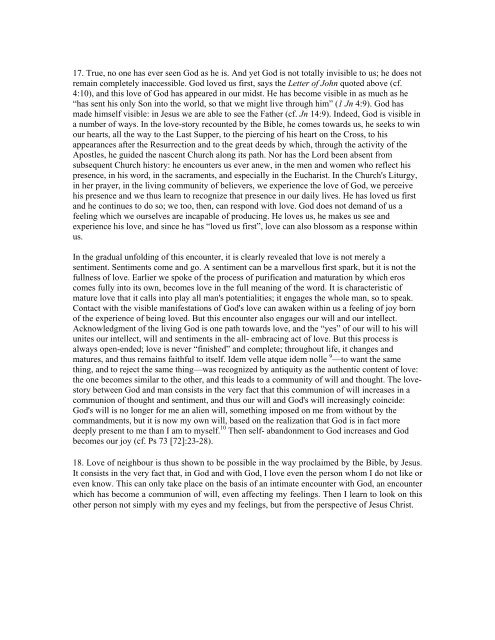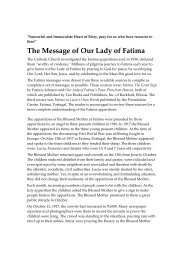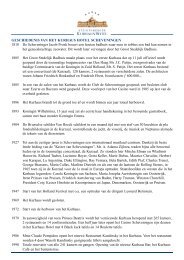God Is Love - Beeldbibliotheek
God Is Love - Beeldbibliotheek
God Is Love - Beeldbibliotheek
- No tags were found...
Create successful ePaper yourself
Turn your PDF publications into a flip-book with our unique Google optimized e-Paper software.
17. True, no one has ever seen <strong>God</strong> as he is. And yet <strong>God</strong> is not totally invisible to us; he does notremain completely inaccessible. <strong>God</strong> loved us first, says the Letter of John quoted above (cf.4:10), and this love of <strong>God</strong> has appeared in our midst. He has become visible in as much as he“has sent his only Son into the world, so that we might live through him” (1 Jn 4:9). <strong>God</strong> hasmade himself visible: in Jesus we are able to see the Father (cf. Jn 14:9). Indeed, <strong>God</strong> is visible ina number of ways. In the love-story recounted by the Bible, he comes towards us, he seeks to winour hearts, all the way to the Last Supper, to the piercing of his heart on the Cross, to hisappearances after the Resurrection and to the great deeds by which, through the activity of theApostles, he guided the nascent Church along its path. Nor has the Lord been absent fromsubsequent Church history: he encounters us ever anew, in the men and women who reflect hispresence, in his word, in the sacraments, and especially in the Eucharist. In the Church's Liturgy,in her prayer, in the living community of believers, we experience the love of <strong>God</strong>, we perceivehis presence and we thus learn to recognize that presence in our daily lives. He has loved us firstand he continues to do so; we too, then, can respond with love. <strong>God</strong> does not demand of us afeeling which we ourselves are incapable of producing. He loves us, he makes us see andexperience his love, and since he has “loved us first”, love can also blossom as a response withinus.In the gradual unfolding of this encounter, it is clearly revealed that love is not merely asentiment. Sentiments come and go. A sentiment can be a marvellous first spark, but it is not thefullness of love. Earlier we spoke of the process of purification and maturation by which eroscomes fully into its own, becomes love in the full meaning of the word. It is characteristic ofmature love that it calls into play all man's potentialities; it engages the whole man, so to speak.Contact with the visible manifestations of <strong>God</strong>'s love can awaken within us a feeling of joy bornof the experience of being loved. But this encounter also engages our will and our intellect.Acknowledgment of the living <strong>God</strong> is one path towards love, and the “yes” of our will to his willunites our intellect, will and sentiments in the all- embracing act of love. But this process isalways open-ended; love is never “finished” and complete; throughout life, it changes andmatures, and thus remains faithful to itself. Idem velle atque idem nolle 9 —to want the samething, and to reject the same thing—was recognized by antiquity as the authentic content of love:the one becomes similar to the other, and this leads to a community of will and thought. The lovestorybetween <strong>God</strong> and man consists in the very fact that this communion of will increases in acommunion of thought and sentiment, and thus our will and <strong>God</strong>'s will increasingly coincide:<strong>God</strong>'s will is no longer for me an alien will, something imposed on me from without by thecommandments, but it is now my own will, based on the realization that <strong>God</strong> is in fact moredeeply present to me than I am to myself. 10 Then self- abandonment to <strong>God</strong> increases and <strong>God</strong>becomes our joy (cf. Ps 73 [72]:23-28).18. <strong>Love</strong> of neighbour is thus shown to be possible in the way proclaimed by the Bible, by Jesus.It consists in the very fact that, in <strong>God</strong> and with <strong>God</strong>, I love even the person whom I do not like oreven know. This can only take place on the basis of an intimate encounter with <strong>God</strong>, an encounterwhich has become a communion of will, even affecting my feelings. Then I learn to look on thisother person not simply with my eyes and my feelings, but from the perspective of Jesus Christ.












